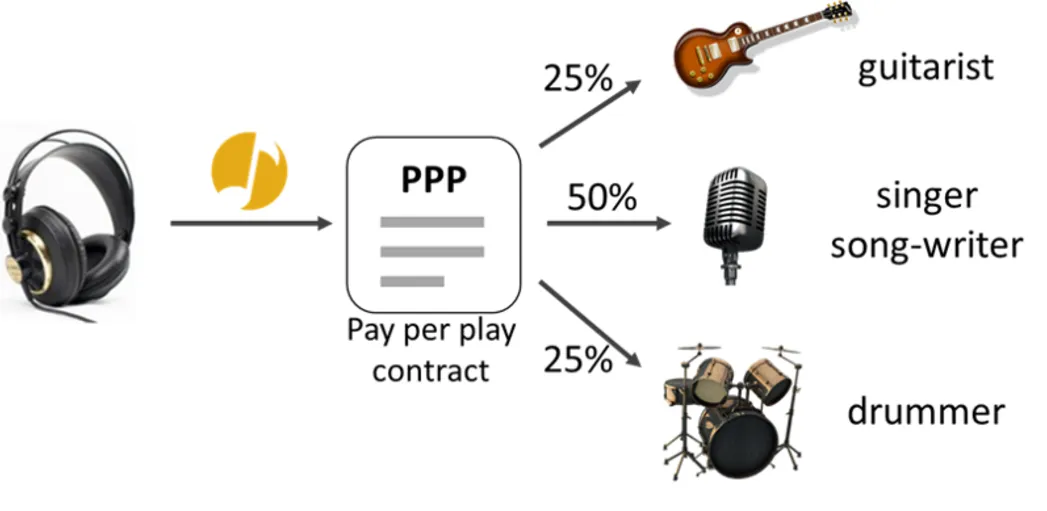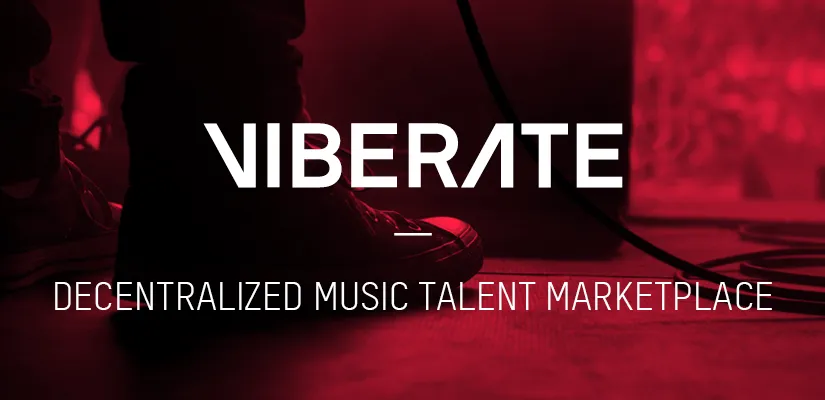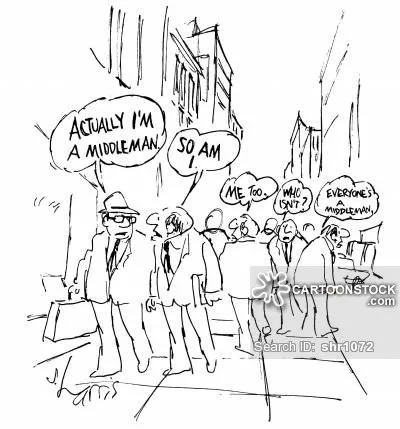Blockchains are suited to taking on industries that have a middle man and the music industry is rife with them. Any blockchain that can bring the music listener and the musician together to transact directly without a middle man (or woman) taking a cut is in the interest of both parties.

MusicCoin.org is creating a musiconomy around the idea that music can be shared directly between the musicians and the listeners without the need for a middle man. They call it Sharism, which involves not only a maximum of sharing capability but also a focus on maximizing value for all stakeholders along the sharing path.
Musiconomy
The concept of Musicoin is to reconfigure the music industry in a way that empowers musicians to publish and distribute their works directly to the market and be remunerated directly and immediately by listeners. The result is an environment where there is minimal need for intermediaries, and which features a positive feedback loop of value exchange that supports an unfettered expansion of the global music economy (musiconomy) as a whole. credit
I've looked into Music Coin and like what I see. The potential for this project is enormous. It could be used to book bands, shows, download music, and buy merchandise all while paying the musicians involved fairly and promptly using smart contracts.
The same could be arranged when a listener hears the song. Each musician on the recording would be paid directly according to the terms of their agreed upon contract.

The blockchain itself does the accounting and doesn't take a cut. Why? Because the miners (witnesses) are rewarded for processing transactions and mining coins with $MUSIC coins.
The coin is doing well on the exchanges with $12,759,632 in market cap and $8,629,440 it trade volume in the last 24-hours.
Music Coin is looking to compete with sites like Spotify and Google Music and looks promising.
WHAT IS MUSICOIN?
Musicoin is not just a currency. It’s an ecosystem - one that enables Musicians to release their works, create simplified licenses and get paid - directly and immediately - every time a music lover listens to a song.
Musicoin employs blockchain and ‘smart contract’ technology to execute a usage contract along with a payment transaction - automatically and seamlessly - each and every time a listener clicks the ‘Play’ button. No industry intermediaries required. No monthly fees. So everybody wins. credit
What Is Viberate?
A similar site name Viberate which will be launching in 8-days seeks to bring live music and cryptocurrencies together to allow musicians to be paid for their shows in a new crypto token called Vibes.
A live music industry token anyone can earn and spend. Viberate is a crowdsourced live music ecosystem and a blockchain-based marketplace where we're matching musicians with event organizers.credit
For example, let's say you have a band and are booking a gig at a club. The club owner can pay with Vibes directly to the band and the coins would be split by an agreed upon digital contract so all the musicians get paid directly.
No more managers or prima donna lead singers running off with the band's money. No more middle men taking a cut unless you program the contract that way.

They have over 100,000 sign ups and a group of music industry professionals on board and even @charlieshrem is involved with this platform.
Here is their launch video and the ICO is on September 5th.
Viberate.com / Token Crowdsale / Explainer video

Co-founder Vasja Veber said in his blog recently:
What we are interested in is giving musicians an opportunity to charge for their gigs in cryptocurrencies. We want to do for music what Airbnb did for tourism. credit
Man, I wish that was around when I was gigging and I wish Airbnb was around too. Although room service is nice.
Veber went on to say,
“Live music is actually the primary revenue source for musicians nowadays. Actually, we could say that professional musicians make the majority of their income with performance fees and just a fraction of royalties and other revenues that originate from recorded music. We are not at all interested into the recorded music segment. There's not enough opportunity in it and there is a lot of competition in the Blockchain scene already tackling problems in that segment.” credit
While it could be a long shot that any big superstars would want to be paid in crypto anytime soon, Verber explains that is not the market they are going for anyway.
“We don't expect the big guys to jump on the band wagon right away. But they were never our target group anyway and we don't expect Justin Bieber or Coldplay to be ready to accept Bitcoins or Vibes in exchange for their services.
Our main target group has always been the underdogs. Local musicians, low profile garage bands who need a place to offer their performances to promoters and clubs. And those are usually younger people, millennials, who are quite fond of cryptocurrencies. They are our true ambassadors and there's a lot of them.
We estimate that around 80 percent of all musicians in the world are unsigned, meaning they don't have an agent to represent them. Now we want to be their agent and we'll offer them all the tools they need to become successful performers and make a living by doing what they love.” credit
What excites me the most about these new platforms is they can get music directly to an audience without the middle man. This is more powerful than people realize and I expect to see some new artists rise to stardom using these alternative music outlets.
Why Musicians Need To Eliminate The Middle Man
Things have changed since I was in the music business but some things never change. Sales, middlemen, and how the profits are split.
When I was touring and selling CDs before getting signed the math looked like this.
Cost per CD: $1.00
Sale Price: $10.00
Profit: $9.00 100% to the band
After getting signed it looked like this.
Cost per CD: $1.00
Sale Price: $10.00
Profits: $9.00 14% to the band or $1.26
My profit went from $9.00 to $1.26.
And that is only the half of it. The record company will not pay you that $1.26 until all expenses are deducted first which means you may never get paid.

That's why some bands that can sell 10,000 copies of their own CD without being signed can often do better without a recording contract.
They could take that $90,000 profit and hire their own publicist, radio promoter, and agent and still have some left over to record another CD.
Either way, they will end up paying the costs whether they are signed or not so why not keep more of the profits?
With blockchain based music apps you don't need to be a superstar to make a good living.
Amanda Palmer is a great example of someone who turned her small but loyal fan base into a very profitable relationship by giving her music away for free. You can read more about her at Turning Your Audience Into Supporting Fans - Her Music Is Free But Fans Paid It Forward To The Tune Of 1.2 Million USD
She would not have been able to do that with middlemen holding their hands out and in the way of her creativity.
Yes, if you're a musician you owe it to yourself to look into these opportunities and take advantage of them.

Related Posts
Busking Online Musicians Taking Music Off The Streets To Create Online Tip Jars --- by @luzcypher
Turning Your Audience Into Supporting Fans Her Music Is Free But Fans Paid It Forward To The Tune Of Usd1 2 Million --- by @luzcypher

